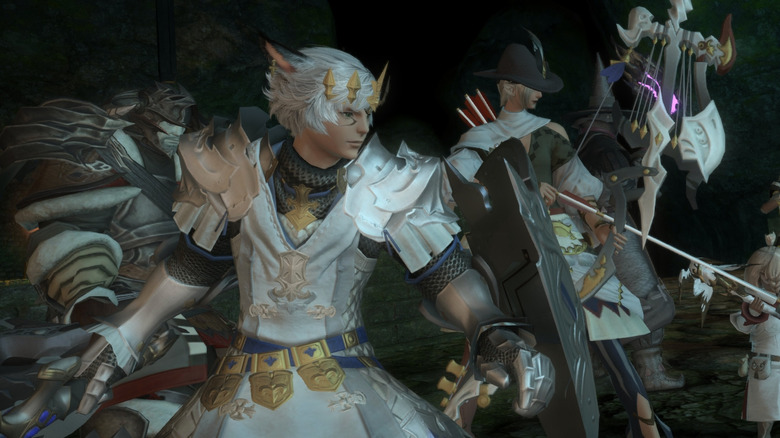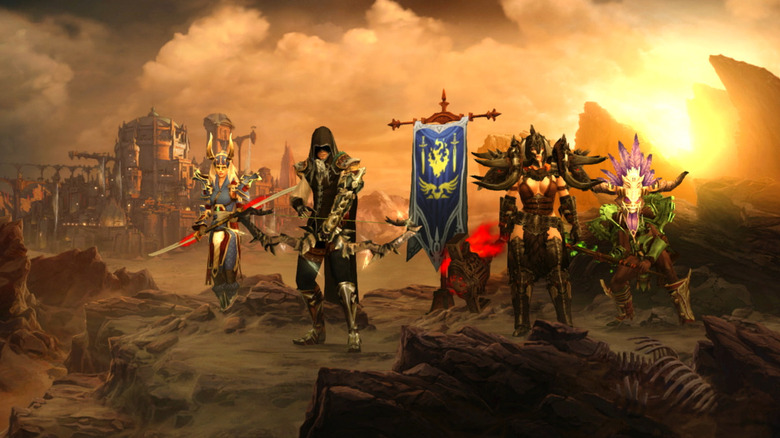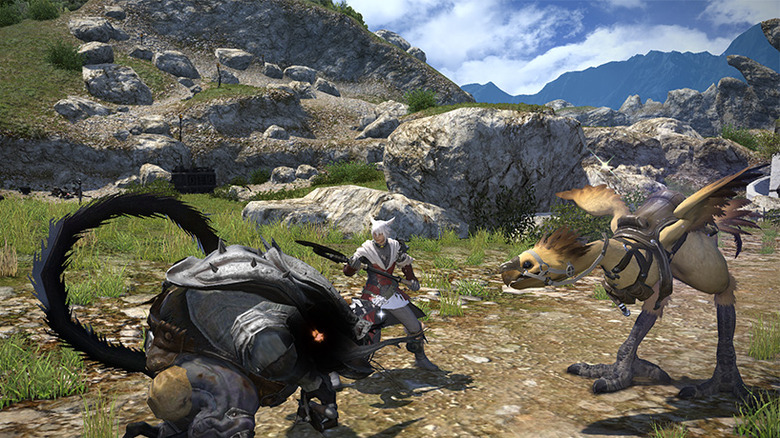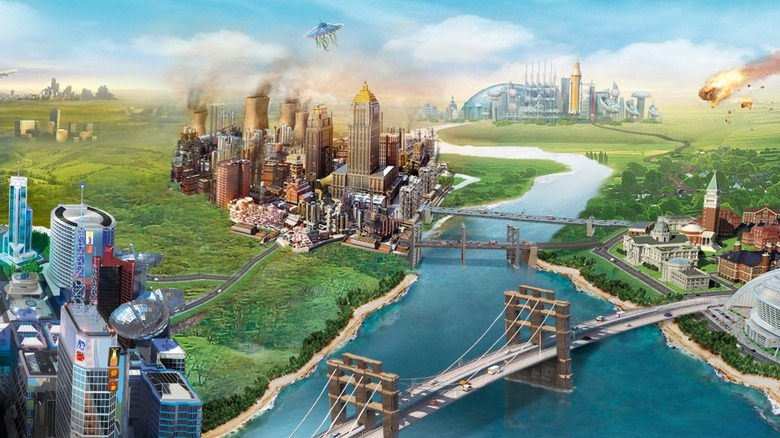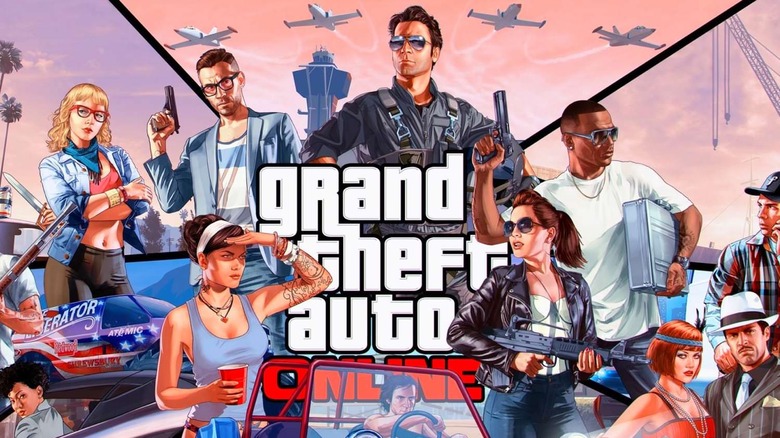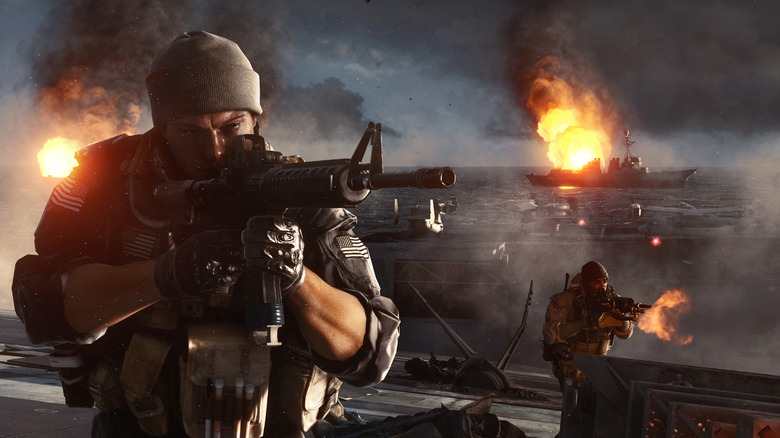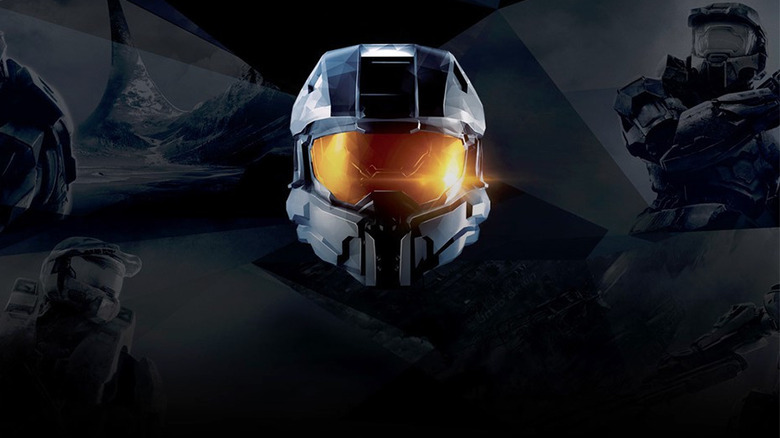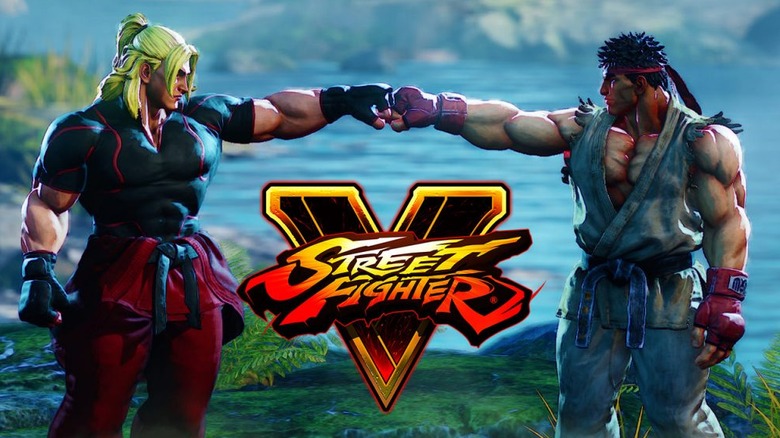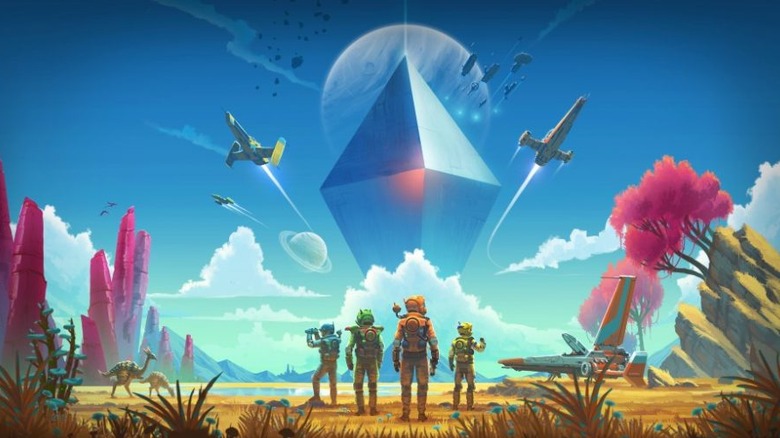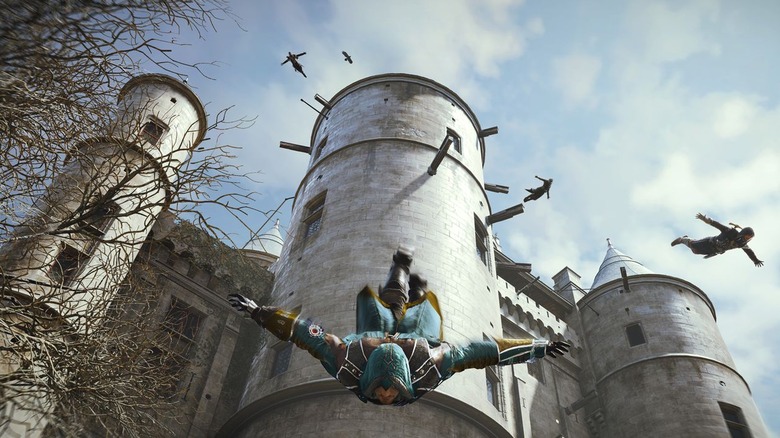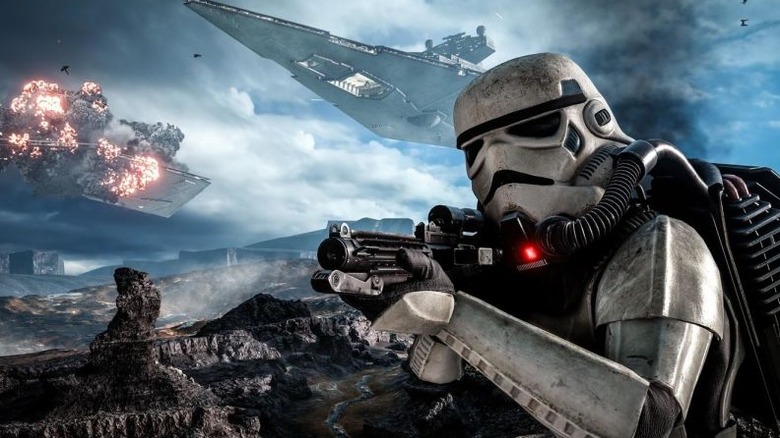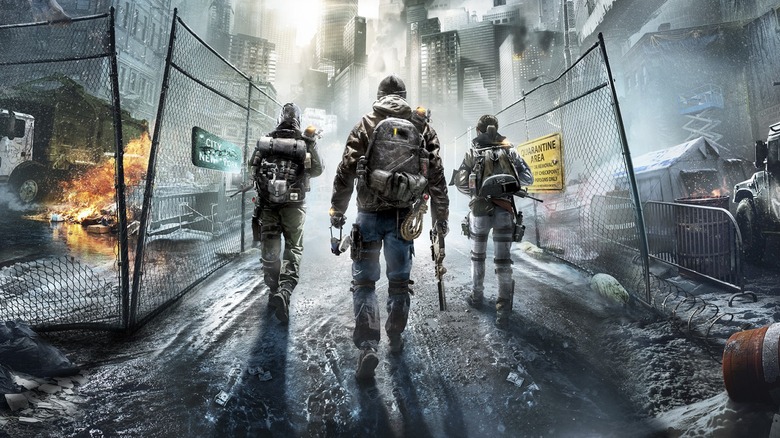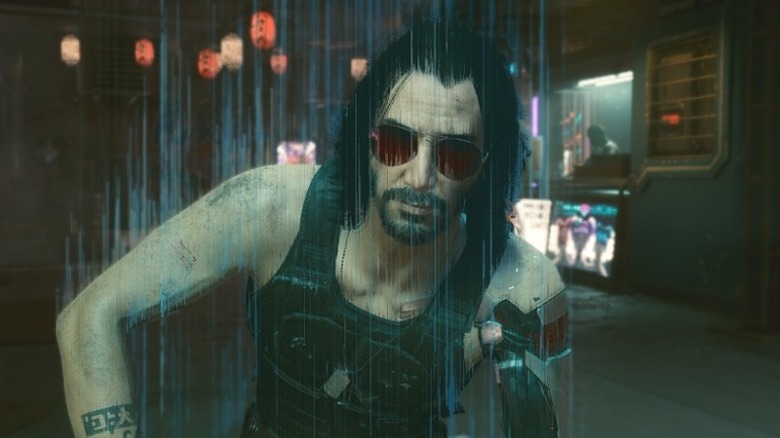Great Games That Started Out Absolutely Terrible
It's hard to admit, but not all video games are winners right out of the gate. For every AAA title that is embraced by the masses and adored by the critics, there are still others that just completely miss the mark. Sometimes the games don't function as advertised, or they have trouble keeping up with the number of players attempting to hop online. Other times, they're released in a glitchy, half-finished state and filled with hilarious (and annoying) bugs that make you wonder if someone fell asleep at the wheel while programming it.
Occasionally, these games are written off as failures and simply forgotten when something better comes along. Other times, developers and publishers will buckle down and actually attempt to right what went so terribly wrong. It doesn't always happen overnight, but it's always worth noting when the folks behind a sub-par game take it upon themselves to give us what was promised, or at least an approximation. Here are some good games that had pretty rough starts.
Diablo 3 was less than magical
"Diablo 3" was released with many of the hallmarks of a difficult launch, including server issues that made the online-only game impossible to log into. The game was too difficult for many players, since helpful items were not dropped often enough. As if that didn't already ruin the normal flow of progression, "Diablo 3" featured something called the Auction House, an in-game shop that essentially encouraged players to pay to win, spending their real-life cash for in-game gold and better gear. This was probably why the game was so stingy with Legendary item drops, but it also essentially made the traditional grinding that comes with RPGs and MMOs "pointless," as pointed out by The Gamers Trust.
Blizzard listened to fans' complaints, tweaking the gameplay to make it easier for new players and more fun for longtime franchise fans. The Auction House was dumped, and a system referred to as "Loot 2.0" made it more likely for players to find decent item drops that suited their character and playstyle. Best of all, the game no longer kicked people off constantly.
Final Fantasy 14 had to be dreamed up again
To put it mildly, the original release of the much-anticipated "Final Fantasy 14" was an absolute disaster. GamesRadar+ called it "a swampy muck of bugs, quirks, and design decisions," with particular vitriol aimed at the game's "unstable servers, a nightmarish user interface, and awful quest design." This was especially heinous when you consider that "Final Fantasy 14" had a subscription service attached to it when it launched.
In response to the intense backlash, Square Enix issued an apology for the poor state of the game, also offering subscription discounts while they worked things out. The servers for the original version of the game were eventually shut down to make way for the retooled version of the game, the aptly named "Final Fantasy 14: A Realm Reborn." This version of "FF14" was received much more warmly; Polygon called it "a completely different and infinitely better game — the series' greatest shame transformed into one of its most exciting and unexpected triumphs."
SimCity had a weak infrastructure
One of the early strikes against 2013's "SimCity" was that it couldn't be played offline. This isn't such a huge deal, except for the fact that the EA's servers frequently went down when it launched. But that wasn't all. The game was such a glitchy, crashing mess that it took nearly a week for most people to even be able to log on and put any time into playing "SimCity," and that was only possible when several of the game's features were disabled. Essentially, people had a barely functioning game, stripped of most of its content, for which they had already paid around $60.
Needless to say, people weren't pleased. Looking back on the game's launch, the game's creative director, Ocean Quigley, said, "That was pretty much the hardest part of my career."
In the years after its difficult release, several patches and tweaks made "SimCity" a much more enjoyable game to play. For one thing, you could actually, you know, play it now. Moreover, players weren't forced to be online in order to enjoy it. For those who did log on, they were greeted with a pleasant and largely glitch-free multiplayer experience.
Grand Theft Auto Online was criminally inept
"Grand Theft Auto 5" was a massive success upon launch, but it took its online counterpart a bit of time to catch up. Kotaku described the game's launch state as "empty and aimless." Constant server issues meant that players were getting booted from their games or were unable to join sessions at all. Even worse, players found their characters randomly deleted or save files corrupting, losing any gear they'd purchased for the game with real-world money.
Thankfully, these issues have been addressed over the years, and tons of new content has been rolled out for "GTA Online" on a regular basis. It has become a playground of interactive casinos, multiplayer heists, street races, and all-around wackiness, like a scavenger hunt involving action figures. In other words, there's plenty to do, and it's much more functional than it was at release. Rockstar also releases regular patches and updates to fix and smooth out the experience for players both online and offline. Sure, the game still has its dumb aspects, but it's mostly all in good fun ... and it wouldn't really be "GTA" without some absurdity.
Battlefield 4 led to a lawsuit
"Battlefield 4" is an example of a game that sold very well, but to its detriment. The problem here was that the game was bought by tons of people who then discovered that it was a total mess. Save files became corrupted, and the game frequently crashed. This eventually led to a class action lawsuit from a firm who believed the game's publishers, EA, had intentionally misled consumers into buying a game that did not resemble what was promised. EA was similarly sued by shareholders who felt that their shares were hurt by EA's perceived negligence. EA emerged victorious from both lawsuits.
Still, following the backlash from its problematic release, which EA referred to as "unacceptable," the game's developers at DICE put aside everything else they were working on (including upcoming expansions for the base game) so that they could focus on fixing "Battlefield 4." And fix it they did, complete with a total overhaul of the game's user interface and less-glitchy matchmaking. PCGamesN said of this new, more complete version of "Battlefield 4": "It may have collectively taken almost two years, but 'Battlefield 4' is now a smooth, reliable experience."
Halo: The Master Chief Collection had major issues
In a look back at how "Halo: The Master Chief Collection" has improved over the years, Kotaku called it "one of the better examples of how it's never too late to get things right." Today, "The Master Chief Collection" is regularly updated with fun new modes of play, graphical overhauls, and speedier matchmaking, all of which encourage players to jump back in now and then to see how this solid remastered collection of previous "Halo" games has improved.
This is in stark contrast to the version of the collection that was initially released. The biggest issue was that the online portions of the game hardly worked. Forbes' Paul Tassi described his multiplayer experience as being one of "long matchmaking wait times, lopsided teams and errors that would fail to connect me to a game, or boot me out of one entirely." The title's connectivity issues have largely been corrected, and other improvements have been made, including adding a remastered version of the beloved "Halo: Reach" to the collection.
Street Fighter 5 didn't come out swinging
Though the "Street Fighter" series is one of the most beloved in the fighting game genre, the fifth main installment suffered in a few key areas. The biggest problem was that it was simply rushed to market, resulting in a rather bare bones experience. The character roster was smaller than expected (only 16 at launch), and there was a serious lack of content for single players. "The game's shop was not yet ready [and] the Cinematic Story Mode was not yet included," noted Event Hubs; "The general consensus was that 'Street Fighter 5' was a widely incomplete title." The game even featured unlockables that players could earn (after some grueling grinding), but then would have to wait for the game shop to open before they could be redeemed.
Since the game's underwhelming release state, Capcom has added new characters and modes through DLC and released an "Arcade Edition" that featured a graphical overhaul. While it's still somewhat underwhelming compared to other landmark entries in the series, "Street Fighter 5" finally resembles as complete game.
No Man's Sky was vast, but empty
"No Man's Sky," upon release, was essentially the ultimate example of a developer over-promising and under-delivering. It was meant to be the ultimate space exploration game, letting players visit a seemingly endless number of different planets and make their mark on the game's vast universe. Unfortunately, the execution wasn't there. As Game Informer put it, "The hype didn't match the reception. The visuals were less than advertised, the gameplay was grindy and repetitive, and the lack of multiplayer caused people to second guess their decision to pay 60 hard-earned dollars for an empty universe. "
Since then, "No Man's Sky" has received numerous updates, some of which almost make it feel like a brand new game. There's been a much stronger embrace of multiplayer missions and cooperation, as well as a conversion that has made it playable in VR. In many ways, "No Man's Sky" is finally the game that was promised to players back in 2016. Best of all, the biggest updates have been free, so there's never been a better time to pick up the base game and dive into the solid game that it has become.
Assassin's Creed: Unity was a glitchy mess
From wild glitches that saw characters spawning without faces to dramatic framerate issues requiring a massive update patch, "Assassin's Creed: Unity" was a buggy, nearly unplayable mess at launch. Ubisoft not only apologized for releasing a game that was so terribly broken, but Ubisoft Montreal CEO Yannis Mallat admitted that "the overall quality of the game was diminished," but they also canceled their original plans for the game's season pass. Since then, they have released numerous fixes that have resulted in a much more playable experience, with Game Informer assuring fans that "it's safe to come back."
In something of a sweet epilogue to the sordid tale of "Unity," Ubisoft made the game temporarily free as a tribute to the Notre Dame Cathedral, also donating €500,000 toward the efforts to rebuild it following the fires that ravaged the monument. Aside from it being a nice sentiment, it also shows that Ubisoft feels substantially better about the game's reputation in its current state.
Star Wars: Battlefront 2 started on the dark side
"Star Wars: Battlefront 2" was the subject of a great deal of controversy when it was in beta testing. Many players felt that its loot system represented the very worst type of "pay to win" mechanics, throwing off any feeling of natural progression that could be found in a more traditional game. Users could spend real money to acquire in-game currency and unlock extra experience points, gear, and characters. These could also be purchased with a different in-game currency through regular play, but the prices of these "loot boxes" were so high that it would take literal days to farm the currency the old-fashioned way.
EA removed microtransactions from the game shortly before its official launch date, while also giving the overall progression system something of an overhaul. When the microtransactions were reinstated, they were only for cosmetic items, meaning players couldn't just buy their way to victory. The game was mostly seen as an improvement over EA's first "Battlefront" installment, with additional DLC bringing in a deeper storyline for the core game and various other fun modes of play.
Tom Clancy's The Division didn't add up
There was a bit of trepidation surrounding "Tom Clancy's The Division" when Ubisoft declined to activate the game's servers until after its official release date. This meant that there were no critical reviews available when the game launched. When it did come out, there were multiple connection errors, rendering the game essentially unplayable for a large number of the folks who bought it. Those who were able to log in were still stymied by the finicky collision system that kept them trapped in safe houses and other smaller areas, unable to walk past (or through) other soldiers to get where they needed to go.
Since then, Ubisoft has released multiple patches to fix the problems in the launch state of the game. Not only that, but "The Division" has seen a few DLC that have expanded on the story of the game and provided a more cohesive and exciting experience. In a happy epilogue to the saga of "The Division," the sequel was seen to be an improvement over the first installment.
Cyberpunk 2077 was unfinished
"Cyberpunk 2077" spent nearly a decade in development, only to release as a shadow of what players expected. After years of gameplay previews and trailers, not to mention the support of national treasure Keanu Reeves, "Cyberpunk 2077" hit store shelves in an unfinished state. Missions glitched and could not be completed, several features promised in earlier previews were missing, and the game's infamous Braindance sequences caused seizures in some players. The game was soon pulled from PlayStation storefronts and investors started suing publisher CD Projekt for damages. All in all, one of the messiest launches in gaming history.
Since then, CD Projekt Red has shifted its efforts to bringing "Cyberpunk 2077" up to its typically lofty standards. Bugs have been fixed, visuals have gotten a facelift, and character AI has been improved. Combat is tighter and the skill tree has been completely reworked for new missions, new romances, and new possibilities. Perhaps best of all, these overhauls have been provided to fans who own the base game at no additional charge. For many gamers, "Cyberpunk 2077" is finally the game they were promised from the beginning.

